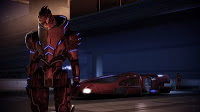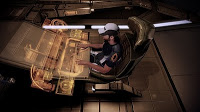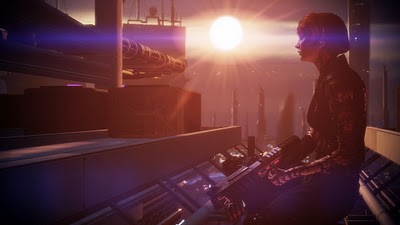This post has not been edited by the GamesBeat staff. Opinions by GamesBeat community writers do not necessarily reflect those of the staff.
Although in typical Bioware style the game never lets itself get stuck in one genre for too long, Mass Effect 2 is primarily a shooter, albeit one which always leaves one foot in the rpg genre. It's thankful therefore that this area has been the one to see the most radical changes from the first. In these sections the game manages to feel like a shooter first and an RPG second, bullets do differing levels of damage depending on their hit location, and you never feel like you're missing shots because your character stats decree this must be so.
Mass Effect 2's shooting never reaches the levels of its non-RPG
brethren, thanks to its controls which can often fall apart in close-quarters, but if you're playing the game as a shooter, then you're doing it wrong. To make up for this, there are a great number of special moves for you and your squad mates to make use of depending on your class, and importantly these are the primary orders you can give. As such they add a layer of strategy to the game which gets very satisfying when you get skilled enough to have one squadmate throw and enemy into the air, another to deactivate their shields, whilst you can easily shoot away their remaining health.
As good as these sections are though, they're not likely to be what you remember after finishing the game. Moral choices pepper the beginning, climax, and even the middle of most missions, and their effects vary from having an extra wave of enemies to fight, to losing entire extra crew members. Most of these choices occur within dialogue trees, which allows the game's sublime voice acting to make those choices that much more personal. Although the game pretty clearly spells out which choice it deems to be the 'good' option, some choices are genuinely very taxing.
No matter how difficult, these choices would mean nothing were it not for both characters and a universe that you care about. Mass Effect 2 has both of these and so much more. Every character has a backstory, every planet a description, and then beyond this there are literally pages upon pages of codex entries for almost every alien and technology you come across within the game. There's more here than you could ever hope to digest in a single playthrough, but this is a good thing rather than a waste. It creates a sense of a universe that exists beyond your game, that keeps ticking even when you've left the area. The game doesn't really have to push you towards saving the universe, because you already want to.
This desire might just be as a result of how good everything looks however. Mass Effect 2's finest visuals are undoubtedly in its larger areas, where in the distance there's always a stream of hover-cars or an impossibly tall skyscraper. Fittingly the game's character's are visually the same way. Generally speaking, the more fantastical the creature design is, the better the graphics engine presents it. When it gets to the creature equivalent of the indoor corridor, the human, the visuals fail to impress. At these moments it's hard to notice though, because the quality of the acting is more than enough to pull through.
It's such a shame then, that far from just letting you get on with the game – which it manages to encourage in so many other areas – it's resource collection minigame is slow, tedious, and will ruin a good few hours of the game's length. The problem is that the vast majority of the game's resource currency isn't available within its missions, you have to search for them in your ship. This involves scanning planets for various minerals in a time consuming minigame which never gets fun, even when you happen upon a mother load of resources. If you want to buy many upgrades for your crew, then you'll have to pay a pretty hefty price.




